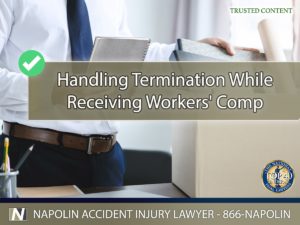Handling Termination While Receiving Workers’ Comp in California
In the state of California, navigating the terrain of workers' compensation can seem like a daunting task, especially when faced with the additional stress of job termination during the recovery period. This comprehensive guide is designed to illuminate the path for injured workers, providing a detailed exploration of the rights, protections, and steps necessary to navigate these challenging circumstances. It delves into the intricacies of California's workers' compensation laws, offering clarity and direction to ensure that employees are fully informed of their entitlements and the protections available to them under the law.
Understanding Workers' Compensation in California
Workers' compensation in California serves as a critical support system for employees who suffer work-related injuries or illnesses, offering benefits that cover medical expenses, lost wages, and rehabilitation services. The state's workers' compensation system is structured to provide these benefits without the need for proving employer negligence, making it a no-fault system. This framework is intended to ensure that injured workers receive prompt and effective medical treatment and financial support, facilitating their recovery and return to work. However, the process of claiming these benefits can become complex, particularly when an injured worker faces termination from their job during this vulnerable time.

Key Components of Workers' Compensation Benefits
Key Components of Workers' Compensation Benefits
The benefits under California's workers' compensation system include medical care, temporary disability benefits, permanent disability benefits, supplemental job displacement benefits, and death benefits. Medical care is provided to help the injured worker recover from an injury or illness caused by work. Temporary disability benefits are payments if the worker cannot do their usual job while recovering. Permanent disability benefits may apply if the worker doesn't recover completely. Supplemental job displacement benefits are vouchers that help pay for retraining or skill enhancement if the worker cannot return to their previous job, and death benefits are paid to the dependents of a worker who dies from a work-related injury or illness.
Eligibility and Filing Process
To be eligible for workers' compensation, an employee must have sustained an injury or illness directly related to their job duties or workplace environment. The process for filing a claim begins with notifying the employer of the injury or illness, followed by completing a claim form (DWC-1) provided by the employer. It's imperative to act promptly, as delays can affect the eligibility and receipt of benefits. Once the claim is filed, the employer's workers' compensation insurance carrier will assess the claim to determine eligibility for benefits.
Your Rights Under California Law
California law robustly protects workers who file for workers' compensation, explicitly prohibiting employers from retaliating against employees for utilizing their legal rights to claim workers' compensation benefits. This protection is a cornerstone of the system, ensuring that injured workers can seek compensation without fear of negative repercussions, such as termination, demotion, or discrimination, from their employers.

Protection Against Retaliation and Wrongful Termination
Protection Against Retaliation and Wrongful Termination
The state's legislation is clear: any adverse action taken against an employee because they have filed a workers' compensation claim is considered retaliatory and, therefore, illegal. This includes not only termination but also any form of harassment, reduction in hours or pay, demotion, or other punitive measures. If an employee believes they have been the victim of such retaliation, they have the right to file a complaint with the California Department of Industrial Relations' Division of Labor Standards Enforcement (DLSE) or pursue legal action through the courts.
Continuation of Benefits After Termination
Importantly, the termination of employment does not automatically terminate an injured worker's right to receive workers' compensation benefits. Benefits such as medical care and disability payments should continue until the worker reaches maximum medical improvement (MMI), the point at which a doctor determines that the worker's condition is unlikely to improve further. This provision ensures that injured workers continue to receive the support they need, regardless of their employment status.
Navigating Termination and Workers' Compensation
Being terminated while on workers' compensation can be a distressing experience, but understanding your rights and the steps you can take is crucial. First, it's important to verify the reason for termination, ensuring it's not in retaliation for filing a workers' compensation claim. If the termination is unrelated to the claim, such as company-wide layoffs, the worker is still entitled to continue receiving their workers' compensation benefits.
Seeking Legal Assistance
In situations where the legality of the termination is questionable or if the employer discontinues benefits unjustly, seeking legal assistance becomes imperative. A knowledgeable attorney can provide guidance on the best course of action, whether it's negotiating with the employer or insurance carrier, filing a claim for retaliation, or representing the worker in legal proceedings. Legal support can be invaluable in navigating the complexities of workers' compensation law and ensuring that the rights of injured workers are upheld.

Handling Termination While Receiving Workers' Comp in California
Handling Termination While Receiving Workers' Comp in California
Facing termination while on workers' compensation in California presents a unique set of challenges for injured workers. However, armed with a thorough understanding of their rights and the protections afforded by California law, workers can navigate these challenges more effectively. If you find yourself in this situation, remember that you do not have to face it alone. Seeking the guidance of a legal professional can provide the support and representation you need to protect your rights and ensure that you continue to receive the benefits to which you are entitled. Call Napolin Accident Injury Lawyer at (866)-NAPOLIN to schedule a free consultation. Employ the help of an experienced workers' compensation lawyer in Southern California.
- Safely and Legally Navigating Parking Lots in California - July 15, 2024
- Navigating the Aftermath of a Highway Auto Accident in California - July 15, 2024
- An Overview of California's Commercial Truck Insurance Laws - July 15, 2024
